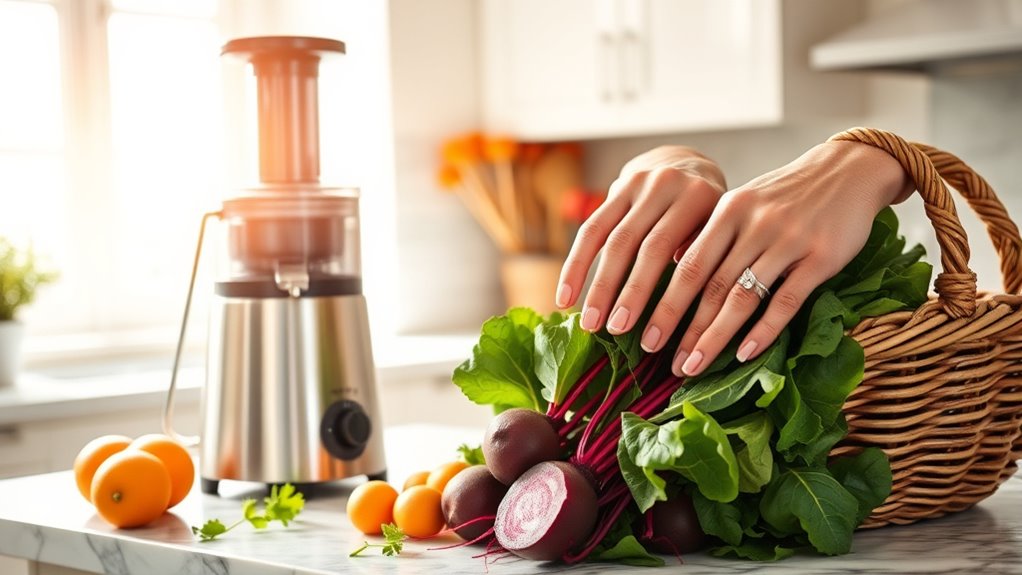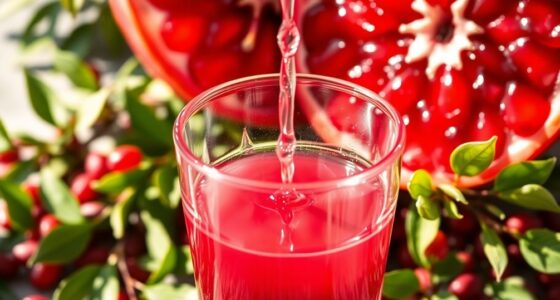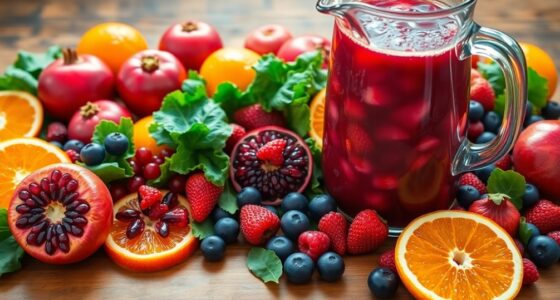Juicing is a fantastic trend for seniors looking to boost their nutrient intake without complex meal prep. It enhances hydration and supplies essential vitamins while being delicious and easy to digest. By choosing nutrient-dense fruits and vegetables, you can target specific health concerns like heart health and inflammation. Plus, it encourages you to enjoy a variety of produce. Keep going, and you’ll discover more about crafting the perfect juice recipes for your health needs!
Key Takeaways
- Juicing boosts seniors’ nutrient intake effortlessly, enhancing hydration and immune function without complex meal preparations.
- Cold-pressed juices preserve nutrients, making them gentler on the digestive system, ideal for seniors with digestive issues.
- Tailoring juices to address specific health concerns, like heart health or inflammation, encourages better overall wellness in seniors.
- Incorporating a variety of colorful fruits and vegetables in juices provides essential vitamins and antioxidants, promoting health benefits.
- Juicing offers a convenient way for seniors with smaller appetites to consume more fruits and vegetables, supporting their nutritional needs.
Juicing Benefits for Seniors: A Nutrient-Rich Boost
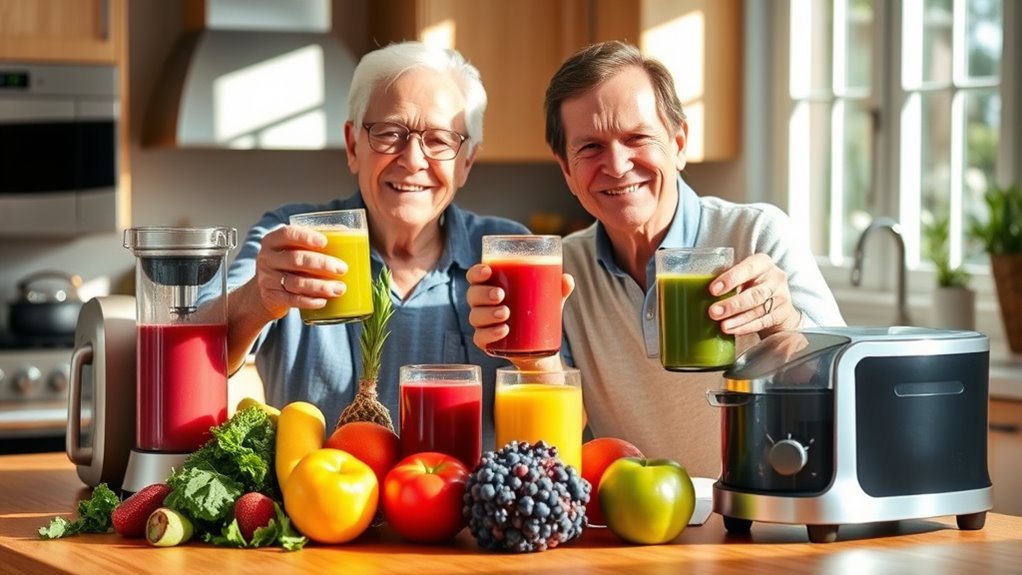
Juicing can be a game-changer for seniors looking to boost their nutrient intake without the hassle of preparing complex meals. By incorporating fresh fruits and vegetables into your diet, you can easily consume concentrated vitamins and minerals essential for your health.
Juicing enhances hydration, supports immune system function, and delivers a nutrient-rich boost that promotes overall well-being. Leafy greens and berries, rich in antioxidants and anti-inflammatory compounds, can be easily included in your juices.
Furthermore, cold-pressed juices preserve more nutrients, making them a great choice if you have digestive issues. Specific juices like beet and pomegranate are particularly beneficial, as they’ve been linked to improved cardiovascular health and reduced blood pressure, helping you manage heart health effectively. Additionally, freshly squeezed juices offer a higher nutrient retention compared to processed options, ensuring you get the most out of your juicing routine.
Choosing Ingredients Wisely
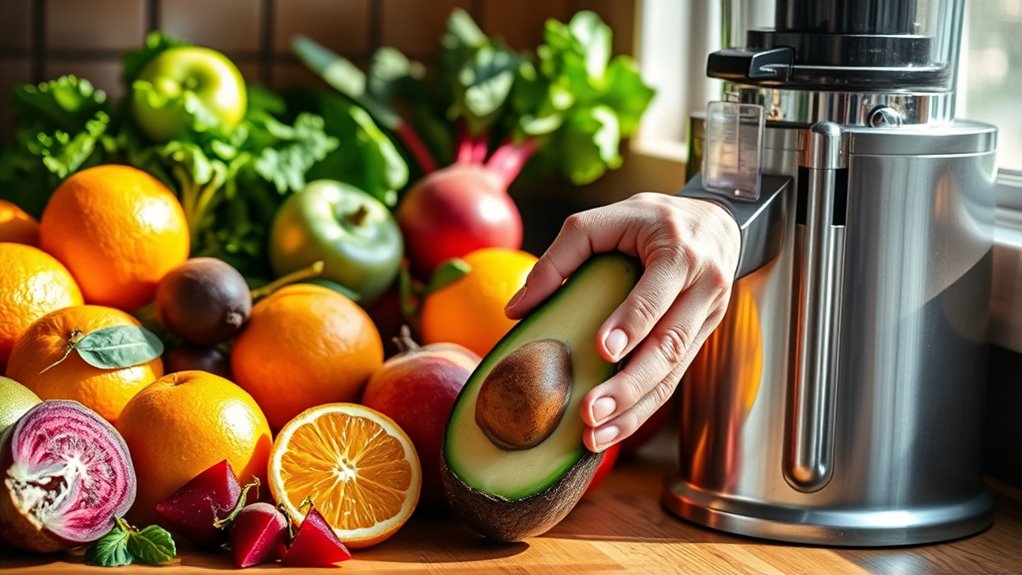
When you choose juicing ingredients, think about specific health issues you want to address.
Combining nutrient-dense fruits and vegetables can help target those concerns while providing a range of essential vitamins and minerals.
Focusing on organic options also enhances the nutritional quality of your juices, making each sip count. Additionally, incorporating celery juice powder can boost hydration and support electrolyte balance, making it an excellent choice for seniors.
Targeting Specific Health Issues
Choosing the right ingredients for your juices can make a significant difference in managing specific health issues as you age. When juicing for seniors, consider ingredients that target your unique needs.
For instance, carrots and ginger can help reduce inflammation, providing relief for those with joint pain. Pomegranate juice supports heart health, making it a smart choice for seniors concerned about cardiovascular issues. Incorporating citrus fruits like oranges boosts your vitamin C intake, essential for hydration and cognitive function.
The ABC juice, combining apple, beetroot, and carrot, offers multiple benefits, including improved blood circulation and vision health. Additionally, adding chia seeds to your juices can enhance fiber intake, promoting satiety and aiding in weight management.
Don’t forget to select organic whole fruits and vegetables to minimize pesticide exposure, ensuring you get the most from the benefits of juicing.
Nutrient-Rich Ingredient Combinations
To create delicious and nutrient-rich juices, it’s essential to carefully pair ingredients that offer complementary health benefits. For example, combining apple, beetroot, and carrot in an ABC juice not only enhances flavor but also contributes to your senior’s diet by providing dietary fiber, improving circulation, and supporting vision health.
Incorporating pomegranate juice boosts the immune system with its antioxidants, while orange juice supplies vitamin C to aid immune function. Additionally, adding garlic can help reduce inflammation and bolster heart health. A combination of high in vitamins A, C, and K from leafy greens can further enhance the nutritional profile of your juices.
Experimenting with ingredients like carrots, parsley, and ginger allows you to create personalized juices tailored to your specific needs. By choosing these nutrient-rich ingredient combinations, you can enjoy tasty juices that promote overall well-being.
Choosing a Juicer
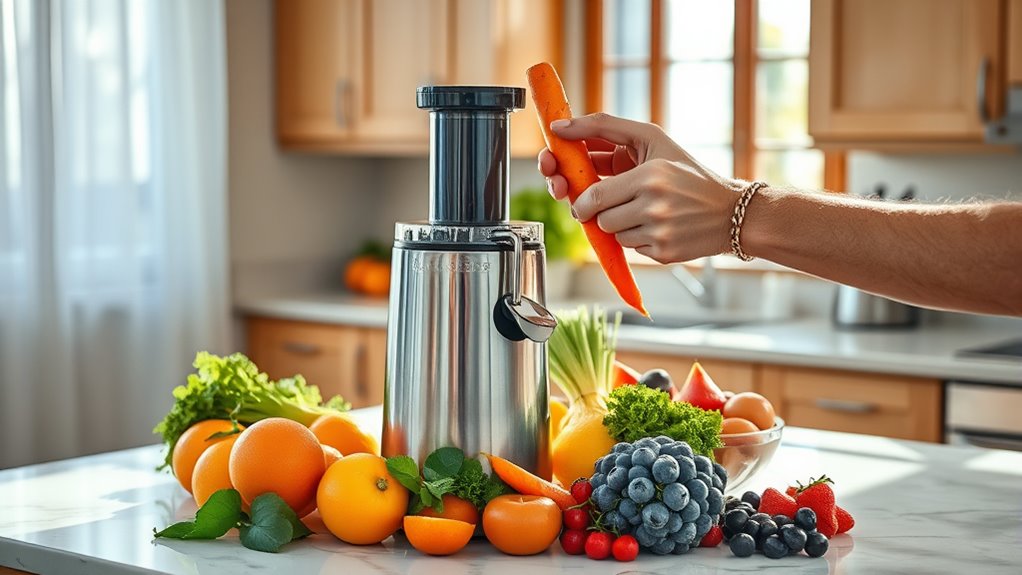
Finding the right juicer can make all the difference in enjoying fresh, nutrient-packed beverages at home. When choosing a juicer, consider masticating or cold-pressed models, as they preserve more nutrients and offer maximum health benefits.
Look for a juicer that’s easy to use and clean, which is especially important for seniors to encourage regular juicing habits. You’ll want a machine that can handle a variety of fruits and vegetables, including tougher options like carrots and beets, to create nutrient-dense beverages. Including juices like celery juice can provide additional vitamins and hydration, which are beneficial for overall health.
If investing in a juicer isn’t for you, cold-pressed juices from the store are a convenient alternative. Research user reviews and ratings to find reliable juicers that meet your health goals and preferences, ensuring satisfaction with your choice.
Avoid Juicing Certain Parts of Fruits and Vegetables
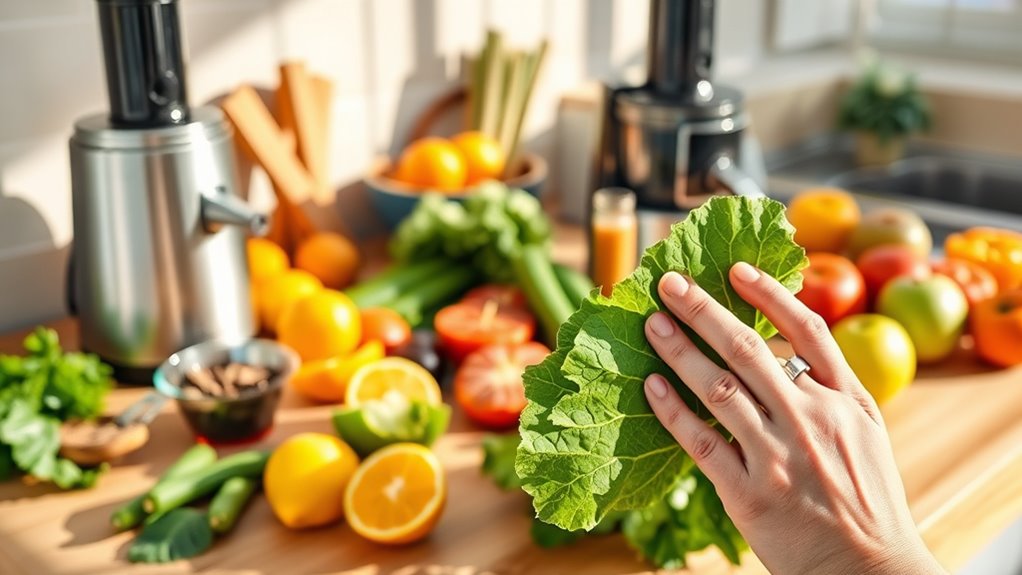
When you’re juicing, it’s essential to know which parts of fruits and vegetables to avoid.
Some skins, like those of apples, offer nutrients, while others, like mango skins, can trigger allergies.
Always research any produce before juicing to steer clear of toxic parts and potential sensitivities.
Toxic Produce Parts
While many fruits and vegetables are great for juicing, it’s essential to steer clear of certain parts that can pose health risks. For instance, avoid citrus rinds, as they can upset your digestive system.
Rhubarb greens are toxic and should never be juiced. Mango skins might trigger allergies, so it’s best to peel them before juicing. Likewise, discard carrot greens, which can cause sensitivities in some individuals.
While some skins are nutritious, they may also harbor harmful pesticides, making organic options a safer choice. Remember, citrus pith is beneficial, but the outer rind is not. Additionally, certain vegetable juices like celery and cucumber are excellent low-carb options, providing health benefits without the risk of toxic parts.
Peeling Debate
The decision to peel fruits and vegetables before juicing often sparks debate among health enthusiasts. While some prefer whole ingredients for ideal nutrition, others argue for peeling to reduce pesticide exposure.
| Fruit/Vegetable | Peeling Recommendation |
|---|---|
| Apples | Skins retain nutrients; wash well. |
| Citrus | Avoid rinds; keep beneficial pith. |
| Mango | Peel to prevent allergic reactions. |
| Rhubarb | Never juice greens; toxic! |
| Carrots | Discard greens to avoid sensitivities. |
Opting for organic produce is key, especially for those on the “Dirty Dozen” list. The peeling debate continues, but understanding these factors can help you make healthier choices and reduce oxidative stress in your juicing routine.
Allergic Reactions
Certain parts of fruits and vegetables can trigger allergic reactions, so it’s crucial to know which ones to avoid when juicing. For instance, mango skins can cause sensitivities, so stick to the flesh.
Citrus rinds might lead to digestive issues; juice only the fruit’s insides. Be cautious with rhubarb greens—they’re toxic and should never be included in your juice. Similarly, carrot greens can also provoke allergic reactions, so it’s preferable to leave them out.
While peeling fruits and veggies can reduce pesticide exposure, only remove nutrient-rich skins if you have allergies or sensitivities. Monitoring for allergic reactions when introducing new foods is essential for your health and wellbeing.
Prioritizing your health and wellbeing means being mindful of your fruit and vegetable intake to guarantee a safe and enjoyable juicing experience.
Select Quality Produce for Juicing
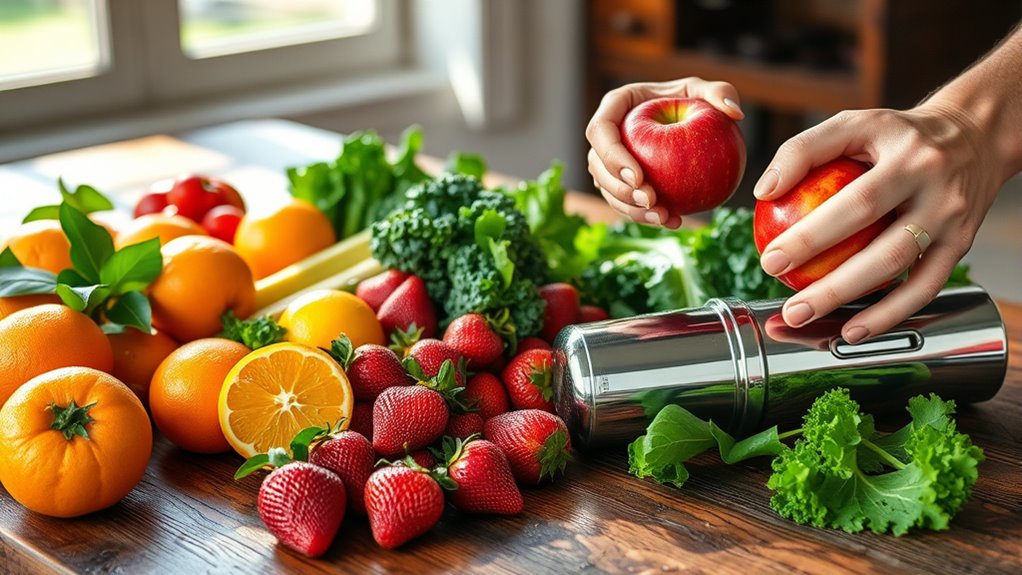
Selecting quality produce for juicing is essential for maximizing both flavor and nutritional benefits. Prioritize organic produce, especially for items on the Environmental Working Group’s “Dirty Dozen” list, to reduce pesticide exposure.
Opt for fresh produce that’s seasonal and locally sourced, ensuring maximum vitamins and minerals that can help support your health. Look for vibrant, colorful fruits and vegetables, as diverse colors typically indicate a wider range of nutrients and antioxidants.
While peels can contain concentrated dietary fiber and nutrients, be cautious of potential pesticide residues. Avoid using skins from fruits like mangoes, which may trigger allergic reactions, and steer clear of toxic rhubarb greens to keep your juicing experience safe and enjoyable. Additionally, consider incorporating essential oils into your juicing routine, as they can enhance flavors and offer potential health benefits.
The ABCs of Juicing for Seniors: Apple, Beetroot, and Carrot
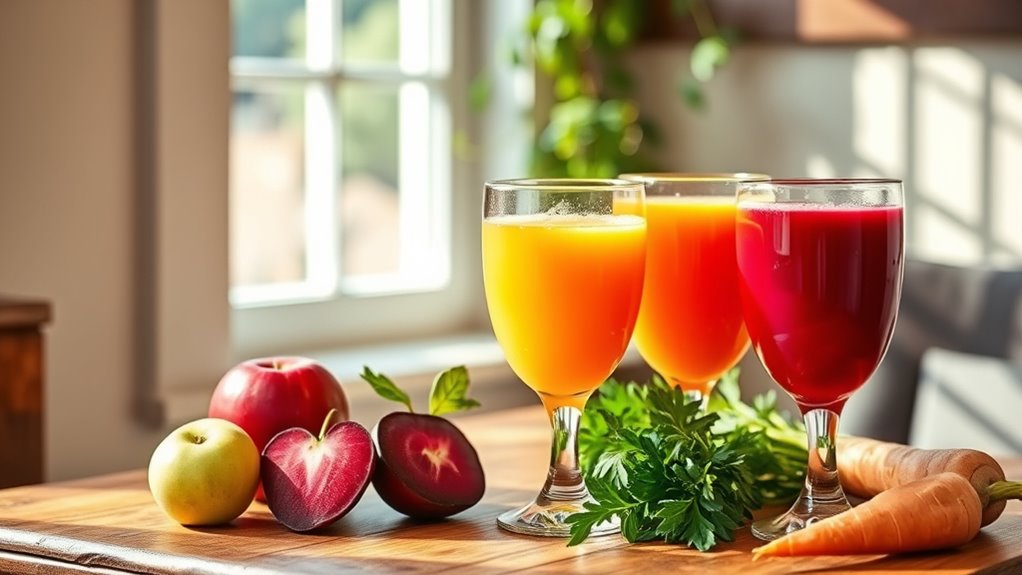
Juicing can be a delightful way for seniors to boost their nutrient intake, and combining apple, beetroot, and carrot creates a vibrant and healthful drink.
Each ingredient offers unique benefits: apples provide dietary fiber and antioxidants, while beetroots enhance heart health by promoting better blood circulation.
Carrots add beta-carotene, vital for maintaining healthy vision and skin. This ABC juice not only tastes great but also supports anti-inflammatory properties, helping seniors manage inflammation effectively.
Plus, if you have a smaller appetite, this juice makes it easier to consume more produce, ensuring you get essential nutrients that may help address deficiencies. Additionally, the emphasis on sustainable fashion extends to food trends, encouraging more eco-friendly choices in ingredient sourcing.
With just a few simple ingredients, you can enjoy a powerhouse of health benefits!
Meeting Nutritional Needs With Fresh Juices

As you explore the benefits of fresh juices, you’ll find that they can greatly help meet your nutritional needs. Here are four key advantages:
- Address Nutritional Deficiencies: Fresh juices can provide concentrated vitamins and minerals, especially beneficial for seniors with diminished appetites.
- Support Immune Function: Juices made from carrots, beets, and leafy greens deliver essential nutrients like vitamin A and folate that boost immunity.
- Easier Digestion: Cold-pressed juices remove fibrous skins, making them easier to digest for those with digestive issues.
- Maximize Nutrient Intake: By prioritizing organic produce, you minimize pesticide exposure while maximizing nutrient absorption, particularly from high-pesticide items like strawberries and spinach.
Additionally, incorporating fresh juices into your diet can support overall wellness as they provide a concentrated source of vitamins and antioxidants.
Incorporating fresh juices into your diet can be a delicious way to enhance your overall health!
Crafting Digestible Juice Recipes for Seniors
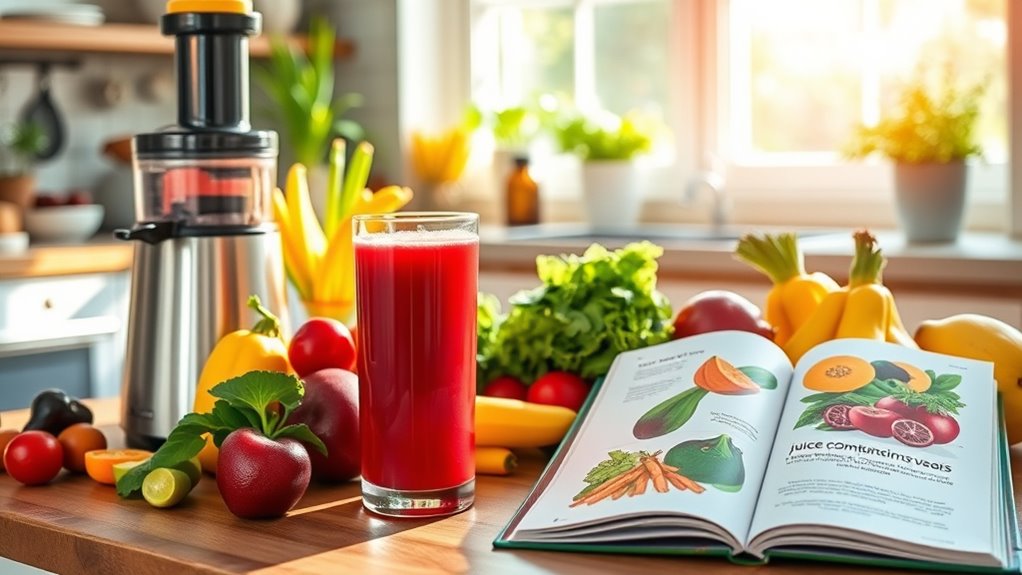
When crafting juice recipes for seniors, it’s vital to focus on ingredients that aren’t only nutritious but also easy to digest. Cold-pressed juices are an excellent option, as they preserve nutrients and are gentle on the digestive system.
Incorporate simple, digestible fruits and vegetables like apples, carrots, and spinach to enhance flavor while providing essential nutrients. Aim for a variety of colorful produce to guarantee a rich supply of antioxidants and vitamins.
You can also add ginger for its anti-inflammatory properties or beets for improved circulation.
Frequently Asked Questions
What Is the Best Juice for Seniors?
When considering the best juice for seniors, you can’t go wrong with cranberry juice, as it helps prevent urinary tract infections and is rich in antioxidants.
Beet juice is great for lowering blood pressure and enhancing circulation.
Pomegranate juice supports heart health, while tomato juice provides vitamin C, essential for reducing heart disease risks.
Don’t forget the ABC juice—apple, beetroot, and carrot—packed with dietary fiber and nutrients for vision and immune support.
What Is the One Fruit All Seniors Should Eat?
You should definitely include oranges in your diet. They’re packed with vitamin C, boosting your immune system and promoting healthy skin.
The flavonoids in oranges help reduce inflammation and support heart health, which is essential as you age. Plus, their high potassium content aids in blood pressure regulation.
With about 86% water, they keep you hydrated, while their fiber supports good digestion. Eating oranges can really enhance your overall health!
Is Juicing Good for the Elderly?
Juicing can be a nutritional powerhouse for you, bursting with vitamins that can make you feel like you’re ready to conquer the world!
It’s especially beneficial if you’ve got a diminished appetite or taste sensitivity. Cold-pressed juices are easier to digest, helping your body absorb essential nutrients.
Just remember to balance your juices with whole foods to keep your fiber intake up and avoid too much sugar. You’ll feel vibrant and energized!
What Is One Downside About Juicing?
One downside about juicing is that it often lacks dietary fiber, which is essential for healthy digestion. Without fiber, you might experience increased blood sugar levels, especially if you’re consuming fruit-based juices high in natural sugars.
Additionally, relying too much on juices can lead to nutritional imbalances since many essential nutrients are found in the pulp and skins that get discarded.
It’s important to take these factors into account when choosing to juice regularly.
Conclusion
Juicing is like giving your body a rejuvenating spa day, providing essential nutrients and flavors in every sip. By selecting the right ingredients and avoiding certain parts of fruits and veggies, you can craft delicious, digestible juices that meet your nutritional needs. Whether you’re blending up apple, beetroot, or carrot, these juices can be a fantastic addition to your diet. So, grab your juicer and start exploring the vibrant world of juicing—it’s a delightful way to boost your health!
Cindy thoroughly researches juicing trends, techniques, and recipes to provide readers with practical advice and inspiration. Her writing style is accessible, engaging, and designed to make complex concepts easy to understand. Cindy’s dedication to promoting the advantages of juicing shines through her work, empowering readers to make positive changes in their lives through the simple act of juicing.

